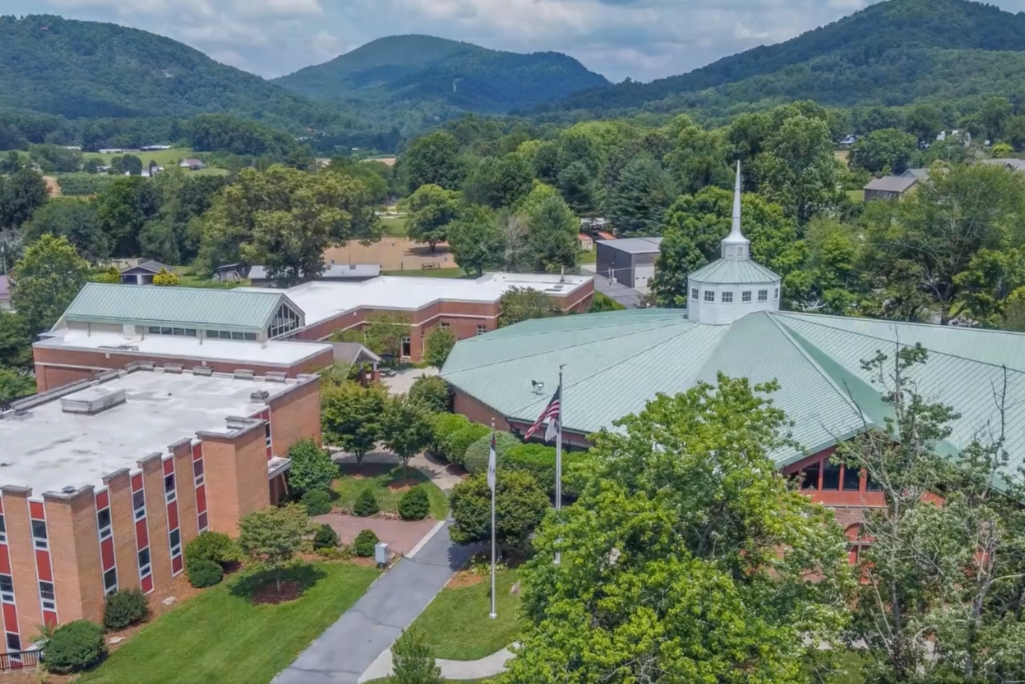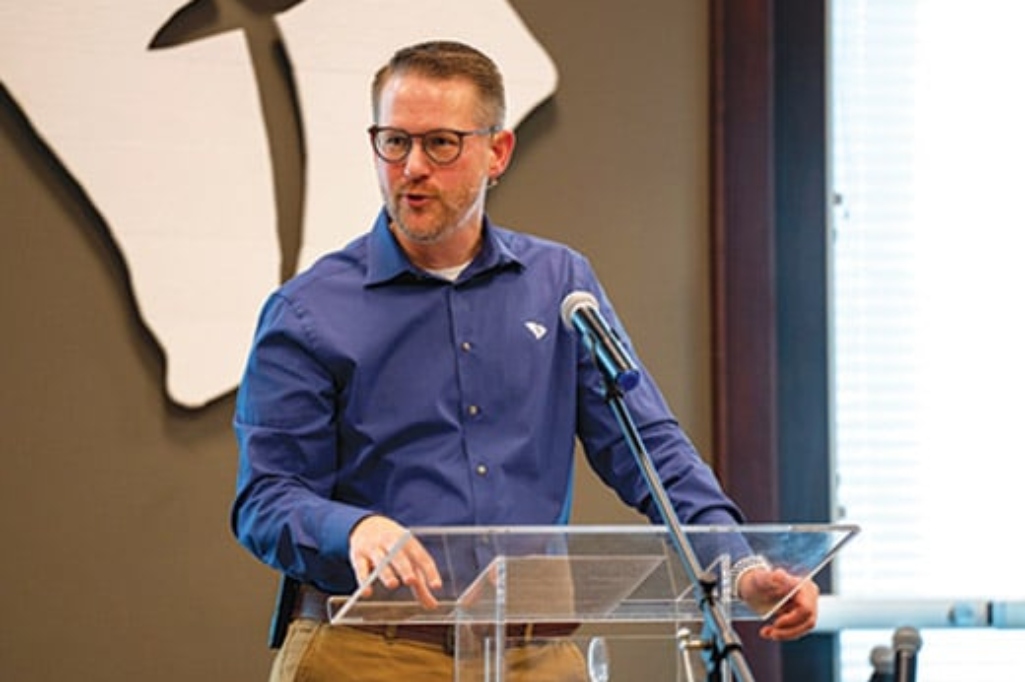
HENDERSONVILLE, N.C. — Fruitland Baptist Bible College will remain in its historic location and committed to its longstanding mission of training pastors and church leaders, according to a preliminary report from an advisory team tasked with evaluating the future of the institution.
The advisory team, which was appointed earlier this year, has spent recent months reviewing the school’s operations, enrollment trends, finances and more. The team’s initial findings, which were shared in a preliminary report to boards of directors for Fruitland and the Baptist State Convention of North Carolina in late September, affirm what many N.C. Baptists hold dear — that Fruitland will continue to equip future generations of gospel ministers.
Steve Scoggins, longtime pastor, Fruitland professor and chairman of the advisory team, told the Biblical Recorder in a subsequent interview following the report’s release that there was never any serious consideration or discussion about selling the campus in the mountains of western North Carolina.
“There are no plans to sell the campus,” Scoggins said. “In fact, we want to see it used in even greater ways. We’re going to put a greater emphasis on training pastors and church leaders, which is what Fruitland has done for 80 years.”
Fruitland is a ministry of the Baptist State Convention of North Carolina and has served as a training ground for pastors and church leaders since its founding in 1946. Many Fruitland alumni serve in churches across the state and beyond.
As part of the advisory team’s preliminary recommendations outlined in the report, the school would cease offering its associate degree and transition from a degree-granting college to a ministry training center that would also include online instruction.
The recommendations call for the campus to be rebranded as The Fruitland Center for Ministry Excellence and brand the online experience as Fruitland Online. A new director of ministry training would oversee the restructured institution instead of a traditional college president.
According to the recommendations, training options would include offering:
• the online associate degree while new training programs are developed.
• Hispanic and other non-English offerings as needed.
• new ministry “essentials” courses to help ministers and laity.
• ministry certificate courses for pastors and other church leaders.
During the proposed transition, school and state convention officials said they would work with students currently pursuing an associate degree to complete their course of study and seek to provide scholarship assistance where possible.
The proposal also outlines several possible expanded uses for Fruitland’s campus, which could include: pastor retreats and sabbaticals; conferences and symposiums; regional conferences and leadership events; hybrid courses; and short-term housing for church interns or residencies.
“This shift represents both a fresh vision and a return to Fruitland’s original purpose,” the report states.
Current Fruitland President David Horton, who recently announced that he will retire in the spring of 2026, said he is supportive of the preliminary report and its recommendations.
“I’m excited about the future of Fruitland, and I’m excited about the recommendations that the advisory team is bringing forward,” Horton said. “I believe it’s right for Fruitland and where Fruitland needs to go in the 21st century.”
As he began thinking about retirement last year, Horton said he requested the formation of an advisory team through the boards of directors of Fruitland and the Baptist State Convention of North Carolina to examine the institution’s future. Fruitland board chair Pat Kilby and N.C. Baptist board chair Robert Hefner appointed the six-member team that is composed of individuals who possess a mix of experience and expertise in ministry, higher education and nonprofit organizations. Both Kilby and Hefner are graduates of Fruitland, and several advisory team members are also Fruitland alums or have strong ties to the school.
The advisory team’s recommendations come at a time of unprecedented challenges in higher education brought about by a variety of cultural, technological and economic factors. The issues have been particularly challenging for small, private institutions. Across the country, dozens of colleges — many with religious affiliations — have faced declining enrollment, financial strain and increasing competition, which has led to a wave of mergers, closures or major restructuring efforts.
Fruitland has not been immune from those challenges.
The report notes that Fruitland has experienced declining enrollment for a number of years. From 1998 to 2007, in-person, on-campus enrollment totaled 200 or more students most years in that decade. Fruitland began offering online classes in 2009, and on-campus enrollment totaled 140 in 2010. By 2024, Fruitland had only 49 full- and part-time students on campus for that year. By 2025, in-person enrollment declined again with 31 total students, only 20 of which are full-time.
Fruitland has also seen a significant drop in online attendance. During the 2024 academic year, Fruitland had 179 individuals taking one or more online classes. In 2025, the school only had 92 online students, which equates to a nearly 50% drop in a single year.
“The decline in students outlined above noticeably began in relation to the economic downturn around 2008,” the report states. “Numerous factors paralleled that season, but perhaps most importantly, many schools and institutions began to intentionally pivot to more digital or non-residential degree tracks and academic programs. Coupled with other major events like the COVID pandemic (2020) and Hurricane Helene’s impact on WNC (2024), the decline intensified.”
Despite the challenges that Fruitland and many other similar institutions face, the advisory team’s work reflects a renewed sense of purpose and possibility. The team’s vision reimagines Fruitland’s ministry as one that is being reshaped for a new generation of pastors and church leaders, continuing a legacy that has guided the school for nearly 80 years.
“Fruitland can return to its ministry training roots and expand into creative niches that meet the needs of NC Baptist churches and ministry leaders well into a bright and fruitful future,” the report states.
Fruitland alumnus Steven Blanton, pastor of Ebenezer Baptist Church in Hendersonville and an instructor at the school, said he believes the members of the advisory team have the best interests of the institution and N.C. Baptists at heart.
“I do believe in the hearts of those who are part of the advisory team,” Blanton said. “I believe their heart and soul is for the good of Fruitland. I would hope that we would remain faithful to our heritage of biblical exposition and shepherding the flock. Two things that you’re going to learn as a student at Fruitland is how to preach the Word and shepherd the people of God.”
Scoggins affirmed that Fruitland’s central focus on training pastors and ministry leaders would remain unchanged.
“We are committed to continuing to train pastors in the Fruitland way that’s been done for almost 80 years,” Scoggins said. “The exact details about how that training will come about is still being worked on, but I want to assure people that the work that Fruitland has been a part of will continue.”
Scoggins also emphasized that the report and accompanying recommendations are preliminary, and that he and other members of the advisory team are still listening to feedback from interested parties.
The advisory team is also hosting a Fruitland listening session during this year’s N.C. Baptist annual meeting in Greensboro as part of the event’s breakout session lineup. The listening session is scheduled for Tuesday, Nov. 11, at 11 a.m., in Auditorium IV of the Koury Convention Center.
“We’re still hearing feedback and analyzing it,” Scoggins said. “The final report will take into account the feedback we’ve received so far and the feedback we receive at the convention.”
A final report is expected to be presented to both the Fruitland and N.C. Baptist boards of directors in January 2026.


